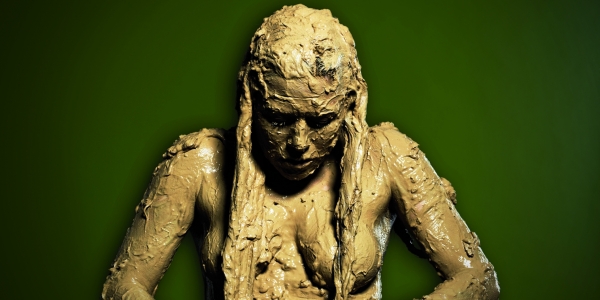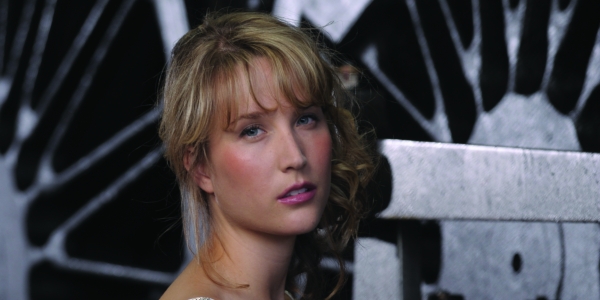“I think I clogged up a couple of drains, to be honest,” Stone laughs when describing the cleanup. But as far as cover shots go, it’s quite emblematic of the creature Stone is playing in the part-gothic, part-religious, part-philosophical play A Golem Story.
Set in Prague in the 1580s, blood-drained children are popping up on the streets. A Rabbi works to create a monster that will avenge these horrible deaths. But the golem has more potential than, perhaps, can be leashed. A Golem Story questions how far a human creation can be taken before it evolves beyond human control. With the golem a seemingly soulless creature, there’s plenty of meat for a philosophical debate.
“[The cast] are definitely wrestling with… whether [the golem] has a soul.” Stone says. “It’s an earth elemental, it’s not human. It’s made from the earth and brought into being with the word of God and it exists only with the word of God and once you remove God from it, it returns to mud.”
The religious tension woven throughout the play also has a particular relevance to Stone; while she still had a chunk of research on her hands, having a Jewish background helped her to better understand the myth of the golem.
“I am actually Jewish, but there’s definitely lots of research to be done, and I’m certainly not the best Jew in the world! But we have a really amazing Rabbi with us on stage and off-stage…he’s our advisor and he sings in the show… [the golem role] does actually take a lot of research, but my journey is a little bit outside [those Jewish] rules… The character itself is existing outside rules.”
Stone appreciates the importance of religion in the central narrative of A Golem Story, which is part of what makes the play so compelling: “This [play] comes down to a really strong religious tension as well, so that’s woven in through at the same time. [It’s] that question of what should we create and what shouldn’t we create, so it’ll be really interesting to see how people respond and how the Jewish community responds.”
For such a dark and complex piece, it also helps that Stone is working with a playwright she knows well; Lally Katz and Stone both worked on Frankenstein in 2008. “Lally Katz is a genius, and I say that with full confidence… I think she’s extraordinary and I think she writes extraordinary plays.” Having a well-respected playwright on board has translated in a work that questions the darker aspects of human life. “[ A Golem Story] is pretty exciting stuff,” Stone adds. “[The setting] exists completely outside any domestic realm; [it has] huge ideas, huge questions about life and belief, [about] what makes us human and what doesn’t make us human, and what gives us a soul and what denies us a soul. They’re really big, exciting questions.”
With all its talk of gothic atmospheres, other-worldly beings and the tensions between life and religion, A Golem Story seems like it has tapped a very current trend. So, no comparisons to the vampire-heavy world of Twilight then?
“[A Golem Story] is in a completely different world. It deals with some pretty strong religious theology…The setting may, [on the] surface, have echoes of that [vampire world], but no, it’s completely different. It’s a very strong, European setting… I actually just came back from being in the synagogue that the story is set in… It’s not a gothic feel, it’s a very real story, it’s been a very real story for many generations. It’s actually a myth that… has an exciting superhero element to it, rather than a dark and gothic element.”
The superhero angle raises questions about how A Golem Story relates to the everyday viewer, one who doesn’t find themselves particularly capable of superhuman feats. But, as Stone points out, the play has alarmingly relevant correlations to contemporary life.
“Certainly, I think that the greatest, strongest comparison would be the creation of nuclear warfare… Those things that we create that we can no longer have the power to control, things that go beyond our control. So it kind of links in with a grand tradition of Frankenstein and things like that. [A Golem Story] is about human creation and hubris, and when our creations overleap our intentions and become really dangerous or powerful.”
Stone was 14 years old when she landed her first acting role, so she has significant experience both on stage and on screen. Her screen credits includeMe Myself I with Rachel Griffiths, mini-series The Farm with Greta Scacchi and Colin Friels, All Saints and alsoSpirited with Claudia Karvan. Her theatre credits include Ladybird, Summer Of The Seventeenth Doll and Diary Of A Madman – with a very close-shaved head. If Natalie Portman did it, surely Stone could get away with it for the sake of art?
“I wish that I got more comparisons to Natalie Portman! That would be awesome,” she laughs. “Someone did offer me a seat on a really crowded tram. She was about 60, and I kind of laughed and said, ‘Oh no, I’m fine’. She looked at me in this really concerned way and said, ‘Are you sure?’ and I realised that she thought that I was recovering [from cancer]. I do get a little bit of cancer stuff every now and again. I had [hair] shaved to the skin for about four months, and most of the time people were just afraid of me.”
After a run of successful television appearances and award nominations including a win for Best Supporting Actress at the 2008 Sydney Theatre Awards, Stone is clearly capable of playing both stage and television roles. However she doesn’t have plans to zone in on any particular medium just yet.
“I’m really just interested in creating really good stories in whatever medium they happen in, and [television and stage] are both really different. You do have more control as an actor in theatre, but I find both of those worlds really fascinating. I’ve definitely been in the theatre world a lot more consistently of late…I think they’re vastly different, but I think I’m very interested in both.”
In light of the richly layered themes behind A Golem Story, what, then, makes a good play? “Curiosity and a continuing interest in it.” she says, without hesitation. “I do think that curiosity and giving a shit is really the most important thing. Beyond that, whatever you wake up with in the morning is what you’ve got…I definitely know that giving a shit is really important. When you’re doing things that you love, it’s not really a job, it’s a life.”

